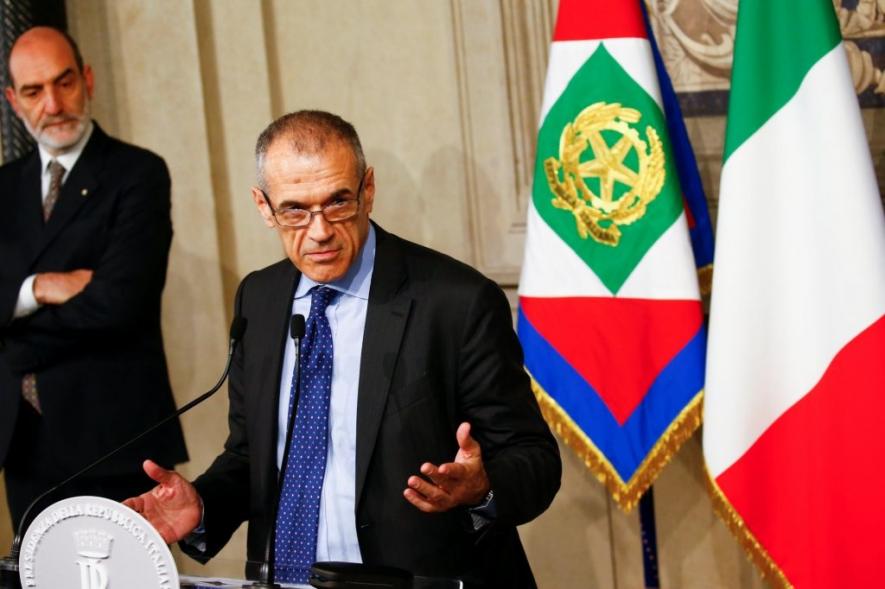Italy Headed For Polls As Interim PM Fails to Win Parliamentary Support

Former senior International Monetary Fund (IMF) official Carlo Cottarelli speaks to the media after a meeting with Italy’s President Sergio Mattarella at the Quirinal Palace in Rome, Italy, May 28, 2018. REUTERS/Tony Gentile
The political deadlock in Italy over the formation of a government is likely to end only with fresh elections after an IMF technocrat, Carlo Cottarelli, who was appointed as the interim Prime Minister by President Sergio Mattarella, failed to win enough support from political parties to form a government. The polls may be held in late July or early August.
Cottarelli was appointed after the resignation of Giuseppe Conte, a law professor chosen as the Prime Minister by the coalition which was on the verge of forming a government. His resignation came in response to the President’s decision to veto the appointment of 81-year-old economist Paolo Savona as the Finance Minister on May 27, on the grounds that appointment of a Euro-skeptic to such a crucial position might trigger a loss of investor confidence. Conte was to head a government comprising the anti-establishment Movement Five Star and the far-right party, The League.
The programme the coalition had agreed upon involved many measures which would have required a violation of the commitment the previous government had made to the EU to reduce Italy’s budget deficit.
After the May 4 election resulted in a hung assembly, the Movement Five Star, which emerged as the party with the largest vote share by promising numerous welfare measures, formed an alliance with the xenophobic far-right The League. The latter had been part of a centre-right coalition which together had the highest vote share. The League’s main campaign agenda was a crackdown on immigrants and tax cuts.
While the initial program drafted by the new coalition included a proposal to set up an exit mechanism from the Eurozone, it was dropped in final draft.
However, the program still contained proposals such as a call for the reevaluation of the EU budget, a reform of the bail-in regime and a review of the EU’s economic governance which imposes fiscal constraints on national governments.
The program also promised to reduce the retirement age, introduce a form of universal citizens’ income and to not privatize Italy’s financially stressed national airline Alitalia, which implied an intention to undertake more public investment in it.
Rise in poverty
To implement these promises, an expenditure of 170 billion euros – which is 10 percent of Italy’s GDP – was estimated. Given that reducing taxes was also an assurance made by the coalition, the financing of the programme would have increased Italy’s public debt of 2.1 trillion – which is 132% of its GDP, the second highest in Europe after Greece.
However, Italy’s total indebtedness, including both private and public, is less than that of Britain, France and Spain. The EU’s fiscal rules, though, are applicable only to public debt. Explaining how the EU’s fiscal constraints had suffocated Italy’s economy, Dhaval Joshi from BCA Research pointed out that banks in Italy, like those in Japan, had failed to provide sufficient credit to the private sector. While Japan could deal with the problem by getting the public sector banks to lend even though it increased the country’s debt ratio, Italy, on the other hand, was held back by EU-imposed fiscal constraints.
“Hence, the Italian government was prevented from recapitalizing its banking system, and the Italian economy stagnated for a decade,” Joshi was quoted to have said.
The stance the coalition had taken against EU’s austerity policies was popular in the Italy, which over the last decade has seen a three-fold increase in absolute poverty. As on last year, the unemployment rate among youth in Italy was over 44 percent. The per capita income of Italy today is lower than what it was in 1999 – the year when it adopted the Euro as its currency.
When the calls given by Ministers from European countries and members of the European Central bank to not violate the EU’s austerity policies were dismissed by the coalition leaders, tensions rose high in the EU.
‘Mr. Scissors’ fails to convince
Finally, after the coalition offered the position of finance minister to Savona, an economist who has long advocated Italy’s exit from the Euro, the President vetoed the appointment. Following the subsequent resignation of Conte, the President then appointed Cottarelli, who is known in Italy as ‘Mr. Scissors’ for having proposed in 2013 a 32 billion Euro cut in public expenditure, which would have affected vital services, including national railways and pension.
When these proposals he made as an ‘Extraordinary Commissioner for the Spending Review’ were not implemented, he complained about the lack of cooperation from the bureaucracy and returned to the IMF.
Both the Movement Five Star and The League had harshly criticized the appointment of Cottarelli, who had made it clear that his main task would be to draft the 2019 budget in a way that demonstrated to international investors that the country’s expenditures are “under control.” He said following that, elections would be called next year. However, he was unable to garner enough support in Parliament.
Polls suggest that the coalition might come back to power with a stronger majority in the next election.
Meanwhile, Guenther Oettinger, a German commissioner who oversees the EU budget committee, said “My worry, my expectation, is that the coming weeks will show that the markets, government bonds, Italy’s economy, could be so badly hit that these could send a signal to voters not to elect populists from the left or right.” This comment, perceived by many as a threat, has further intensified the anti-EU sentiments of the Italian electorate.
However, even if the coalition is re-elected on a much more stronger anti-EU mandate, exit from the EU or even the eurozone is not going to be an easy task. Any attempt to do so will cause investors in the financial market to demand a higher return for holding Italian government bonds, as the perception of risks associated with it would have increased. The European Central Bank, which has been buying Italian government bonds as a stimulus to keep the economy afloat, is also likely to stop purchasing them. This will raise the interest rates in Italy, which may in turn lead into a decline in investments and higher unemployment.
The Bank of Italy has called upon the political leaders to not “disregard” the financial constraints imposed by the EU, with the Bank’s chairman further warning that Italy was at the risk of losing “asset of trust”, Guardian reported.
Yield on 10-year Italian government bonds already showed a spike on May 29. The value of the Euro against US dollar has dropped to its lowest since the last 10 months. Fear that an Italian exit will trigger a crisis in the entire eurozone has caused a decline in the stock market, not only in Europe but also in the US and parts of Asia.
With questions of the economy and issues such as immigration at stake, the Italian voters are likely to face an unenviable choice in the coming elections.
An exit from EU will require Italy to carefully reorganize its economy and currency in a way that the control over them rests with its government, and is not vulnerable to financial markets. A strong political leadership will be absolutely necessary to persuade the Italian population to weather the turbulence that will invariably follow any exit from EU or eurozone, without caving in to the demands of EU or financial markets. Without an alternative economic plan and a strong political resolve, Italy may be compelled to agree with William Hague’s description of euro as “a burning building with no exits”.
Get the latest reports & analysis with people's perspective on Protests, movements & deep analytical videos, discussions of the current affairs in your Telegram app. Subscribe to NewsClick's Telegram channel & get Real-Time updates on stories, as they get published on our website.
























